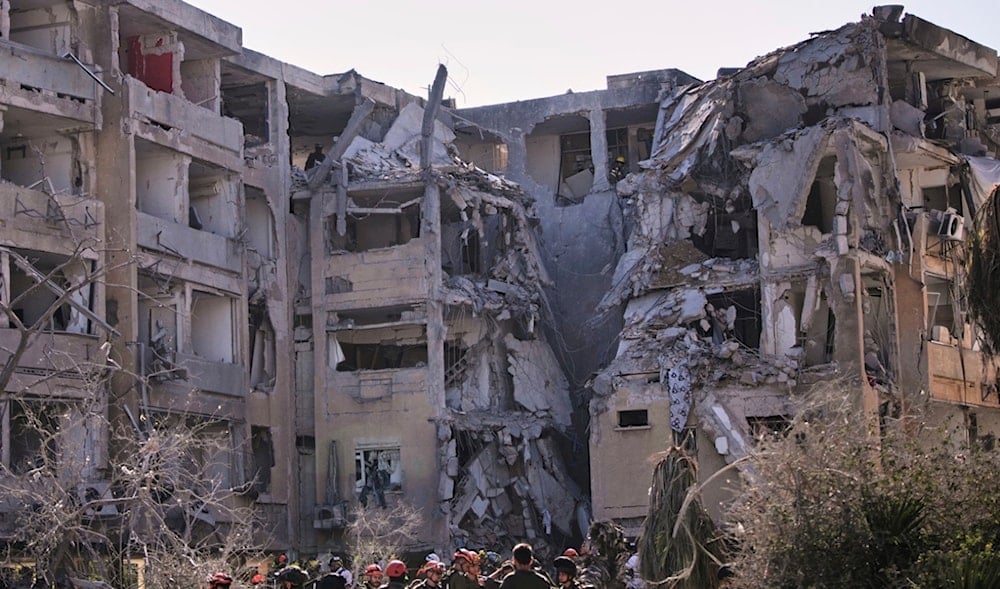Israeli ministers target foreign media over Iran strikes coverage
Israeli ministers Itamar Ben-Gvir and Shlomo Karni accuse foreign media of violating censorship by airing footage of Iranian missile strikes, prompting criticism from opposition leader Yair Lapid.
-

Israeli security forces inspect a destroyed building that were hit by a missile fired from Iran, in Holon, near Tel Aviv, Thursday, June 19, 2025. (AP)
Senior ministers in the Israeli government have escalated pressure on foreign media outlets, accusing them of endangering Israeli security by broadcasting footage from Iranian missile impact sites, drawing criticism from opposition figures and media watchdogs amid ongoing internal conflict.
Police Minister Itamar Ben-Gvir sent a letter to the acting head of the Shin Bet domestic intelligence agency, complaining that "some" foreign media outlets were violating military censorship orders by airing live footage from strike zones, calling on the agency to intervene.
“These broadcasts often reveal the exact locations of missile impacts, the extent of the damage, and in some cases, sensitive visual material from the incident sites,” Ben-Gvir wrote, labeling the practice a "serious national security offense."
In a joint statement, Communications Minister Shlomo Karni echoed the concerns, accusing the media of breaching established censorship protocols.
"Israel" enforces military censorship regulations that require journalists to submit sensitive material for review. The Israeli occupation forces permit coverage from selected impact sites and coordinate media access accordingly.
However, the ministers' crackdown has provoked pushback. Opposition leader Yair Lapid criticized the measures, arguing that broad restrictions on coverage were impractical and counterproductive. “The decision to put into place a sweeping embargo on coverage is unenforceable when everyone has a cell phone with a camera,” Lapid said. “It pointlessly undermines the global support Israel has received this past week.”
Journalists from both foreign and local outlets have been present at strike locations such as Ramat Gan and Beer al-Sabe', often operating under pre-arranged coordination with the IOF.
Footage circulated on social media shows the impact of an #Iranian missile in occupied Beer al-Sabe'.
— Al Mayadeen English (@MayadeenEnglish) June 20, 2025
Israeli interceptors failed to intercept the missile despite the detection of the launch beforehand.#Iran #BreakingNews pic.twitter.com/YhYFWm6dvP
'Israel' bans foreign journalists from covering Haifa oil refinery
On Monday, "Israel" banned international journalists from covering the situation at the Haifa oil refinery after it was struck by Iranian missiles.
Israeli police gave the order after film crews recorded Iranian strikes raining down on the site, actively exposing the occupation.
Iran had asserted that its missiles accurately targeted the oil complex. However, "Israel" refrained from admitting the success of the operation until reports and documentation showed the destruction inflicted on the structure.
The gas refinery in occupied Haifa ceased operations due to massive destruction caused by Iranian missiles. pic.twitter.com/TsCEp4ixry
— Quds News Network (@QudsNen) June 16, 2025
Earlier, the Israeli military censorship allowed the release of information regarding the operation, while Israeli media reported that three settlers died at the oil refinery during the missile strike.
The Bazan Petroleum Company had previously reported to the Tel Aviv Stock Exchange that Iranian missiles overnight had inflicted localized damage to pipelines and transmission lines at its Haifa Bay complex.

 3 Min Read
3 Min Read










